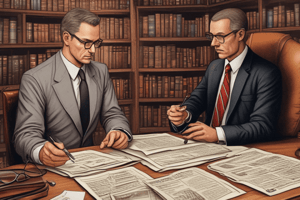Podcast
Questions and Answers
What is a direct consequence of breaching the duty of full and frank disclosure?
What is a direct consequence of breaching the duty of full and frank disclosure?
- The injunction remains in effect.
- The application may be permanently denied.
- The court may impose additional penalties.
- The injunction can be set aside. (correct)
In the context of applying for an interlocutory injunction, what is expected from the applicant regarding the timing of their application?
In the context of applying for an interlocutory injunction, what is expected from the applicant regarding the timing of their application?
- To delay the application until they gather more evidence.
- To apply only if the application is non-urgent.
- To apply promptly after becoming aware of relevant facts. (correct)
- To apply only after the trial concludes.
What does the leading case of American cyanide establish in relation to interlocutory injunctions?
What does the leading case of American cyanide establish in relation to interlocutory injunctions?
- The requirement of immediate compliance with court orders.
- The merits of each application must be fully evaluated before ruling.
- The necessity of evaluating the chances of success on a balance of probabilities.
- Whether there is a serious issue to be tried AND ehe guidelines for the balance of convenience in granting injunctions. (correct)
Which threshold must the applicant meet to demonstrate that there is a serious question to be tried?
Which threshold must the applicant meet to demonstrate that there is a serious question to be tried?
What principle guides the court's decision when assessing the balance of convenience?
What principle guides the court's decision when assessing the balance of convenience?
What must the applicant typically provide regarding damages when granted an interlocutory injunction?
What must the applicant typically provide regarding damages when granted an interlocutory injunction?
What is expected of the applicant when providing material facts in an affidavit?
What is expected of the applicant when providing material facts in an affidavit?
What role does the Vasily Golubin case play concerning duties in an injunction application?
What role does the Vasily Golubin case play concerning duties in an injunction application?
What happens if an applicant fails to demonstrate urgency in seeking an injunction?
What happens if an applicant fails to demonstrate urgency in seeking an injunction?
What is the primary concern of the court regarding Mareva Relief?
What is the primary concern of the court regarding Mareva Relief?
How does a Mareva injunction differ from a proprietary injunction?
How does a Mareva injunction differ from a proprietary injunction?
What must an applicant demonstrate to obtain orders for the taking of samples of property?
What must an applicant demonstrate to obtain orders for the taking of samples of property?
What additional measure may a claimant consider if there is a risk of the defendant destroying evidence?
What additional measure may a claimant consider if there is a risk of the defendant destroying evidence?
Under the new rules, how can the court make orders for the detention or preservation of property?
Under the new rules, how can the court make orders for the detention or preservation of property?
What is the function of an ancillary discovery order in relation to Mareva relief?
What is the function of an ancillary discovery order in relation to Mareva relief?
What must a claimant do to properly submit an application for interim property preservation?
What must a claimant do to properly submit an application for interim property preservation?
What type of relief can Mareva injunctions NOT be used for?
What type of relief can Mareva injunctions NOT be used for?
What is the significance of Rule 3 in relation to property evidence?
What is the significance of Rule 3 in relation to property evidence?
What is the typical sequence regarding the production of documents and AEICs?
What is the typical sequence regarding the production of documents and AEICs?
Which of the following documents must be produced according to Order 11 Rule 2(1)?
Which of the following documents must be produced according to Order 11 Rule 2(1)?
For specific document requests under Order 11 Rule 3(1), what are the required criteria?
For specific document requests under Order 11 Rule 3(1), what are the required criteria?
According to Order 11 Rule 5, what limitations on document production exist?
According to Order 11 Rule 5, what limitations on document production exist?
What does Order 11 Rule 1(2) emphasize regarding document production?
What does Order 11 Rule 1(2) emphasize regarding document production?
What describes an order that mandates the doing of a positive act?
What describes an order that mandates the doing of a positive act?
In which situation is an applicant exempted from giving notice before a hearing?
In which situation is an applicant exempted from giving notice before a hearing?
What is the main purpose of a Mareva Injunction?
What is the main purpose of a Mareva Injunction?
According to the practice directions, how much notice should be given if the application is urgent?
According to the practice directions, how much notice should be given if the application is urgent?
Why is it important for the applicant to disclose all relevant facts in the supporting affidavit?
Why is it important for the applicant to disclose all relevant facts in the supporting affidavit?
What type of injunction application allows the summons to be filed without notice to the defendant?
What type of injunction application allows the summons to be filed without notice to the defendant?
What issue might arise if the court hears an argument without the presence of the other side?
What issue might arise if the court hears an argument without the presence of the other side?
Which of the following does NOT qualify as a document?
Which of the following does NOT qualify as a document?
In the context of electronic documents, what factor relates to the likelihood of locating relevant documents?
In the context of electronic documents, what factor relates to the likelihood of locating relevant documents?
Which statement aligns with the considerations of a claimant when proceeding with a case?
Which statement aligns with the considerations of a claimant when proceeding with a case?
What is the potential risk associated with modern electronic document recovery?
What is the potential risk associated with modern electronic document recovery?
Which legal principle relates to a party's right to privacy during court proceedings?
Which legal principle relates to a party's right to privacy during court proceedings?
Which item listed is specifically excluded from defining a document?
Which item listed is specifically excluded from defining a document?
What does the term 'broader scope of discovery' imply in legal proceedings?
What does the term 'broader scope of discovery' imply in legal proceedings?
Which of the following is NOT a category of electronic devices defined in the context of documents?
Which of the following is NOT a category of electronic devices defined in the context of documents?
What is a crucial aspect to consider when estimating the cost of document discovery?
What is a crucial aspect to consider when estimating the cost of document discovery?
Which of the following best describes the meaning of 'marks' in the context of a document?
Which of the following best describes the meaning of 'marks' in the context of a document?
Flashcards
Mandatory Order
Mandatory Order
An order that requires a positive action to be taken.
Prohibitory Order
Prohibitory Order
An order that prevents or stops an action.
Interim Injunction
Interim Injunction
A temporary court order preventing actions until a full hearing.
Without Notice Application
Without Notice Application
Signup and view all the flashcards
Notice Requirements (Interim Injunction)
Notice Requirements (Interim Injunction)
Signup and view all the flashcards
Supporting Affidavit (without notice)
Supporting Affidavit (without notice)
Signup and view all the flashcards
Duty of Disclosure (Without Notice)
Duty of Disclosure (Without Notice)
Signup and view all the flashcards
Vasily Golubin
Vasily Golubin
Signup and view all the flashcards
Full and Frank Disclosure (injunction)
Full and Frank Disclosure (injunction)
Signup and view all the flashcards
Material Facts in Affidavit
Material Facts in Affidavit
Signup and view all the flashcards
Prompt Application (injunction)
Prompt Application (injunction)
Signup and view all the flashcards
American Cyanide (injunction)
American Cyanide (injunction)
Signup and view all the flashcards
Serious Question to be Tried (injunction)
Serious Question to be Tried (injunction)
Signup and view all the flashcards
Balance of Convenience (injunction)
Balance of Convenience (injunction)
Signup and view all the flashcards
Undertaking as to Damages (injunction)
Undertaking as to Damages (injunction)
Signup and view all the flashcards
Without Notice Application (injunction)
Without Notice Application (injunction)
Signup and view all the flashcards
Mareva Injunction
Mareva Injunction
Signup and view all the flashcards
Discovery Order
Discovery Order
Signup and view all the flashcards
Ancillary Discovery
Ancillary Discovery
Signup and view all the flashcards
Draconian Nature of Mareva
Draconian Nature of Mareva
Signup and view all the flashcards
Proprietary Injunction
Proprietary Injunction
Signup and view all the flashcards
MRAVA (Mareva) Jurisdiction
MRAVA (Mareva) Jurisdiction
Signup and view all the flashcards
Order 13 Rule 2
Order 13 Rule 2
Signup and view all the flashcards
Taking of Samples
Taking of Samples
Signup and view all the flashcards
Destruction of Evidence
Destruction of Evidence
Signup and view all the flashcards
Production of Documents
Production of Documents
Signup and view all the flashcards
When does document production typically happen?
When does document production typically happen?
Signup and view all the flashcards
Scope of Document Production
Scope of Document Production
Signup and view all the flashcards
Special Case for Specific Documents
Special Case for Specific Documents
Signup and view all the flashcards
Limitations on Document Production
Limitations on Document Production
Signup and view all the flashcards
What counts as a 'document'?
What counts as a 'document'?
Signup and view all the flashcards
Electronic Documents in Discovery
Electronic Documents in Discovery
Signup and view all the flashcards
Cost of Discovery
Cost of Discovery
Signup and view all the flashcards
Alteration Risk in Discovery
Alteration Risk in Discovery
Signup and view all the flashcards
The 'Strength of Case' Principle
The 'Strength of Case' Principle
Signup and view all the flashcards
Privacy and Confidentiality
Privacy and Confidentiality
Signup and view all the flashcards
Broader Discovery in Justice's Interest
Broader Discovery in Justice's Interest
Signup and view all the flashcards
Order 11 Rule 1 (1)
Order 11 Rule 1 (1)
Signup and view all the flashcards
Order 11 Rule 1 (2)
Order 11 Rule 1 (2)
Signup and view all the flashcards
Order 11 Rule 1 (4)
Order 11 Rule 1 (4)
Signup and view all the flashcards
Study Notes
Pre-Trial Preparations
- Pre-trial preparations are steps taken by each party to prepare for trial.
- These preparations include logistical requirements outlined in court rules and practice directions.
- The process of gathering and preparing evidence is also crucial.
Trial Process
- Witness and party attendance are covered in the trial process.
- The order of proceedings at trial is also discussed.
- Interim reliefs—orders parties seek before the trial—are included.
Trial Preparation
- Key elements of trial preparation include fixing dates for trial, setting dates to confirm witnesses called, dates for filing documents (AEICs), and dates for setting down the action for trial.
- Decisions on fact witnesses and expert witness evidence are made early in the case.
- Trial preparation focuses on witness evidence and related trial evidence.
Trial Evidence
- Fact and expert evidence presented by parties are the focus.
- Independent witnesses, interested non-parties, or amicus curiae are not directly discussed.
Studying That Suits You
Use AI to generate personalized quizzes and flashcards to suit your learning preferences.




